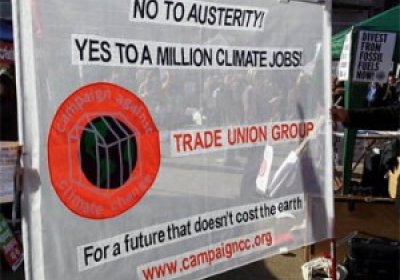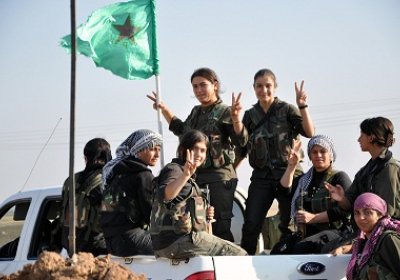What does the victory of radical left party SYRIZA in Greece's January 25 elections mean for politics in Europe, at Europe-wide and national levels? Both levels are closely intertwined, and since SYRIZA’s win have been having rapid feedback effects on each another.
Across Europe, the reverberations of SYRIZA’s win are being felt with rising force, both in “peripheral” Europe, but also in the German-led European Union “core”.
Democracy
The NSW government’s decision to buy back coal seam gas (CSG) licences in the upper Hunter just before a state election raises more questions than it answers.
US hemispheric policy reached a new low on March 9 when President Barack Obama invoked emergency powers to declare “a national emergency with respect to the unusual and extraordinary threat to the national security and foreign policy of the United States posed by the situation in Venezuela.”
Thanks to Obama’s action, the US has now blatantly rehabilitated its traditional imperial posture towards the South and challenged the continent-wide Bolivarian cause of Latin American and Caribbean independence and sovereignty.
The recent 70th anniversary of the liberation of Auschwitz was a reminder of the great crime of fascism, whose Nazi iconography is embedded in our consciousness.
Fascism is preserved as history, as flickering footage of goose-stepping blackshirts, their criminality terrible and clear. Yet in the same liberal societies, whose war-making elites urge us never to forget, the accelerating danger of a modern kind of fascism is suppressed; for it is their fascism.
Some 20,000 people marched through central London on Saturday, in the Time to Act! protest, demanding that climate change be taken seriously by political parties in the coming General Election.
Time to Act!, launched by the Campaign Against Climate Change, brought together a wide coalition of environmental and left wing organisations.
The march was young, vibrant and diverse: placards from the Greens, Socialist Worker and Left Unity mixed with banners and flags from Friends of the Earth, Greenpeace, the Peoples’ Assembly and trade unions.
A largely unknown region to the rest of the world became one of the most talked about globally in recent months.
Kobane is a town that suffered a too-harsh fate. Innocent civilians never think that one day they would face massacres — except that being a Kurd in a town like Kobane (in a largely Kurdish area in the north-west of the Syrian state), means you face such things.
In response to US President Barack Obama’s use of an executive order to sanction Venezuelan authorities, Venezuelan President Nicolas Maduro requested decree powers to pass an “anti-imperialist law to prepare for all scenarios”. On March 11, a majority of Venezuela's National Assembly voted in favour. The bill, which must be approved by 60% of the Assembly according to Venezuela’s constitution, will now move on to a second reading to obtain final approval.
About 10,000 people took part in a peaceful demonstration in Kuala Lumpur on March 7 against the jailing of opposition leader Anwar Ibrahim, Malaysian Socialist Party (PSM) leader S. Arutchelvan (Arul) told Green Left Weekly. Anwar was jailed for a second time on trumped up “sodomy” charges.
The protest was called by a new coalition called KitaLawan (“We Fightback”). Authorities responded by arresting Nik Nazmi, the youth leader of the opposition Justice Party (PKR), and Saifullah Zulkifli, a PKR organiser.
Union of South American Nations (UNASUR) secretary-general Ernesto Samper, said on March 9 that the regional bloc offered total support to the government of Venezuelan President Nicolas Maduro after the US government’s declaration of Venezuela as a national security threat.
US President Barack Obama has issued a decree listing Venezuela as a “national security emergency” for the US, citing alleged human rights abuses and corruption. The US has also imposed extra sanctions on several Venezuelan officials.
US President Barack Obama issued an Executive Order regarding Venezuela on March 9 that escalated US attacks on Venezuela's left-wing government.
The order amounts to an act of aggression against Venezuela's sovereignty by declaring a “national emergency” based on claims the oil-rich South American nation threatens US national security due to alleged human rights violations and corruption.
The Bolivarian Alliance of the Peoples of Our America (ALBA) is an anti-imperialist trading bloc first formed by the left-wing governments of Venezuela and Cuba to promote trade on the basis of solidarity rather than competition.
It has since expanded to include 11 nations, with Venezuela and Cuba joined by Bolivia, Ecuador, Nicaragua, Dominica, Antigua and Barbuda, St Vincent and the Grenadines, Saint Lucia, Grenada and Saint Kitts and Nevis. Honduras was an ALBA member, but was forced to withdraw when a 2009 US-backed coup installed a right-wing dictatorship.
The Bolivian government said the Andean nation’s gross domestic product grew US$34 billion last year, establishing it as one of the fastest growing economies in the region.
Vice-President Alvaro Garcia Linera said that the country’s Social Community Productive Economic Model allowed for the economy to grow, despite a fall in prices for raw materials.
“In 1996 the Bolivian economy accounted for $5.3 billion and by 2005, $9.5 billion dollars,” Garcia said.
- Previous page
- Page 317
- Next page










